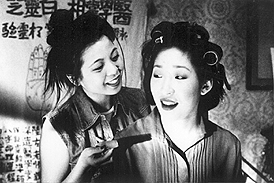 Double Happiness
By Todd Inoue
A funny thing happened at the Asian American Film Festival in San
Francisco. I had just spent 86 glorious minutes with Double
Happiness. The characters were believable, the plot was
fresh, director Mina Shum knew every button to push. I was positively
giddy. When I returned to my car, I found my passenger-side window
smashed and my car stereo MIA.
I called the cops and made a long, music-less drive home, but all I
could think about was the film. At home, I collapsed on the bed,
muttering to my mate about bad news and good news: My stereo was gone,
but I had just seen the best movie of the year.
That was in January. Since then, my insurance hooked me up, and my
opinion about Double Happiness hasn't changed.
Double Happiness tells the story of a 22-year-old aspiring
actress named Jade Li (Sandra Oh), who walks a tenuous tightrope of
dual lives. On one side is her traditional Chinese-Canadian family,
headed by an authoritarian, old-country father (Stephen Chang); on the
other is her contemporary world, bristling with leather-jacketed
prowls, a struggling acting career and a non-Asian beau named Mark.
Jade possesses a distinct, do-good sweetness toward her family, but
pays for it by swallowing humility the size of a baked ham. Ditto for
her trials finding an acting job. When a Hong Kong casting director (a
dazzling cameo by director Shum) wonders why Jade cannot read
Cantonese, she asks, "Are you Chinese?" Good question, as Jade's dual
worlds collide and her identity and self-esteem plummet. With the
pressures of an unsympathetic family and profession piling up, Jade
doesn't explode as much as implode.
Magazine ads describe Double Happiness as a "heterosexual
Wedding Banquet," a limiting and short-sighted comparison. Double
Happiness is better than Wedding Banquet. Shum is the Woody Allen of a
new GenerAsian-accurately tapping into the neurosis of the yellow and
proud. She prefers subtle jabs to outright militancy without
sacrificing message for style.
The scenes are framed like small, separate vignettes that pulse with
realistic dialogue. Shum even borrows a technique she used in her Me
Mom and Mona, a short film about her own family. In a series
of one-on-one shots, each family member takes a moment to tell a story:
the mother describes a village lady nicknamed "dum dum," the father
explains the connection between life and a plentiful garden, the sister
reminisces about her disowned brother. The monologues lend further
intimacy to the film's subjects.
African Americans have Friday or To Sleep With
Anger ; now, Asian Americans finally get their turn to see
themselves accurately portrayed on the screen while the rest of the
populace can eavesdrop and whisper, "What the hell is so damn
funny?"
There are oranges for gifts, newspaper as a tablecloth and red bean
buns as a peace offering. Or consider the marvelous opening sequence
around the dinner table, filmed with the camera mounted on a lazy
Susan-standard equipment of many Asian dinner tables. At the airport,
the Li family greet an uncle from Hong Kong, and the children are
coached to give their greetings in Cantonese. Shum allows a throwaway
scene of getting caught in a rainstorm to turn into a joyous moment of
a rarely documented combination of goofiness and frugality.
Shum works throughout to squash typical mainstream cinema
objectification of Asian females. When Jade first meets Mark, she very
knowingly plays the demure, no-speaky-English act-raising her hand up
to her mouth, averting her eyes and giggling. Jade also visits a
friend's apartment, which she shares with a flaming OGF ("Oriental girl
fetishist") rocker. Jade wanders around the flat adorned with various
"Orientalia"-rice-paper lanterns, sake in the fridge, incense, wall
scrolls-bemoaning the "rice king" and his "Oriental love den." Whether
playing along with the rigmarole or rebelling against it, Jade-and
Shum-let us all in on the joke.
Double Happiness' portrayals are refreshing, its
characters achingly believable-not marinated in schmaltz or stereotype.
The film honestly depicts the strength and mettle of a young woman
coming to terms with her dual identity, with her parents and,
ultimately, with herself. It's the closest representation to
middle-class, Asian Canadian/American life that I've ever seen on
screen.
[ Movies Central | MetroActive ]
| ||||||||||||||||||||||||||||||
Copyright 1994-2025 Weeklys. This page is part of Metro Silicon Valley's historical archive and is no longer updated. It may contain outdated information or links. For currently information, please go to MetroSiliconValley.com home page, e-edition or events calendar.
This page was designed and created by the Boulevards team.
